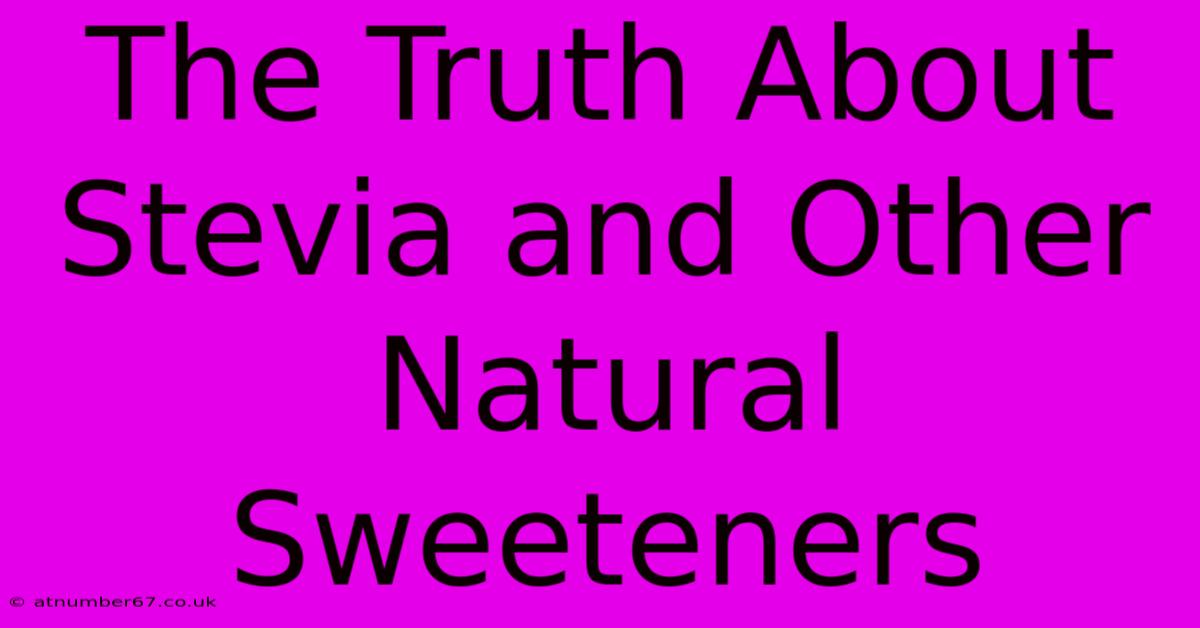The Truth About Stevia And Other Natural Sweeteners

Table of Contents
The Truth About Stevia and Other Natural Sweeteners
Are you trying to cut back on sugar but overwhelmed by the sheer number of "natural" sweeteners on the market? You're not alone! The world of alternative sweeteners can be confusing, with conflicting claims and a lot of marketing hype. This article will delve into the truth about stevia and other popular natural sweeteners, helping you make informed choices for your health and well-being.
Understanding the Sweetener Landscape
Before we dive into specifics, let's clarify what we mean by "natural sweeteners." Generally, these are sweeteners derived from plants, as opposed to refined sugar (sucrose) or artificial sweeteners like aspartame or saccharin. However, the processing methods can significantly impact the final product's nutritional value and health implications.
Popular Natural Sweeteners: A Comparison
Here's a breakdown of some common natural sweeteners, focusing on their origins, sweetness levels, and potential benefits and drawbacks:
1. Stevia:
- Origin: Extracted from the stevia plant ( Stevia rebaudiana).
- Sweetness: Much sweeter than sugar, often requiring a smaller amount.
- Benefits: Zero calories, low glycemic index (meaning it doesn't significantly raise blood sugar), and may offer potential benefits for blood pressure.
- Drawbacks: Some people report a slightly bitter aftertaste. The type of stevia extract (e.g., steviol glycosides) can influence taste and purity. Always check the label!
2. Agave Nectar:
- Origin: Derived from the agave plant.
- Sweetness: Slightly sweeter than sugar.
- Benefits: Contains some trace minerals.
- Drawbacks: High in fructose, which can negatively impact liver health and contribute to metabolic issues when consumed in excess. It has a higher glycemic index than often advertised.
3. Honey:
- Origin: Produced by honeybees from the nectar of flowers.
- Sweetness: Similar to sugar.
- Benefits: Contains antioxidants and small amounts of vitamins and minerals. It possesses antibacterial properties.
- Drawbacks: High in calories and sugar. The type of honey (e.g., raw, processed) impacts its nutritional value.
4. Maple Syrup:
- Origin: Derived from the sap of maple trees.
- Sweetness: Similar to sugar.
- Benefits: Contains antioxidants and small amounts of minerals. Offers a unique flavor profile.
- Drawbacks: High in calories and sugar.
5. Coconut Sugar:
- Origin: Derived from the sap of coconut palm flowers.
- Sweetness: Similar to sugar.
- Benefits: Contains small amounts of minerals and fiber. Lower glycemic index compared to white sugar.
- Drawbacks: Still relatively high in calories and sugar compared to stevia.
Making Informed Choices
The "best" natural sweetener depends entirely on your individual needs and preferences. Consider the following factors:
- Calorie intake: If calorie control is a priority, stevia is the clear winner.
- Glycemic index: For those managing blood sugar levels, stevia and coconut sugar are better options than agave or honey.
- Taste preferences: Some people find the aftertaste of stevia undesirable. Experiment with different sweeteners to find one you enjoy.
- Overall health: While natural sweeteners are generally preferable to refined sugar and artificial sweeteners, moderation is key. Even natural sweeteners should be consumed in moderation as part of a balanced diet.
Beyond Sweeteners: A Holistic Approach to Sugar Reduction
Reducing sugar intake isn't just about swapping one sweetener for another. It's about adopting a holistic approach:
- Read food labels carefully: Hidden sugars are lurking in many processed foods.
- Choose whole foods: Prioritize fruits, vegetables, and whole grains, which naturally provide sweetness without the added sugars.
- Gradually reduce your sugar intake: Sudden changes can be difficult to maintain.
- Focus on healthy habits: A balanced diet, regular exercise, and stress management are crucial for overall health.
Ultimately, the best approach is to make conscious choices about the sweeteners you consume, paying attention to their nutritional profiles and potential impacts on your health. Don't be swayed by marketing claims alone – read labels, do your research, and listen to your body.

Thank you for visiting our website wich cover about The Truth About Stevia And Other Natural Sweeteners. We hope the information provided has been useful to you. Feel free to contact us if you have any questions or need further assistance. See you next time and dont miss to bookmark.
Featured Posts
-
Andrew Garfields Mom Faith Family And Success
Apr 05, 2025
-
Saif Ali Khans Son Overcoming Adversity
Apr 05, 2025
-
Never Miss A Call Nuevo Laredo Time Check
Apr 05, 2025
-
Nuevo Laredo Time Zone Converter
Apr 05, 2025
-
Adam Norris Net Worth The Complete Story Revealed
Apr 05, 2025
